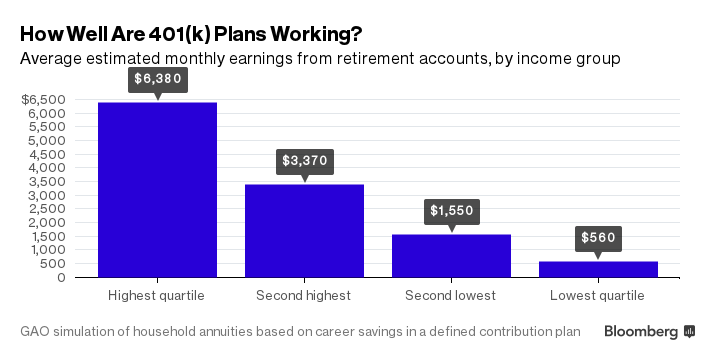
The U.S. retirement landscape is starting to look like a Charles Dickens novel.
Since voluntary savings plans led by 401(k)s have largely replaced traditional pensions, it’s probably no surprise that this is the best of times for many highly paid workers. Equally unsurprising is that this is the worst of times for almost everyone else, especially the 42 percent of workers who don’t have access to a work-sponsored plan. The stunner is just how much the luckiest among us will outpace the unluckiest on retirement day: eleven times as much.
A new report from the Government Accountability Office describes this tale of two Americas. It calculates the effect that unequal pay and limited access to retirement plans will have on today's workers decades from now. It also offers a few suggestions for how Americans might boost their retirement income.
About 60 percent of all U.S. households have no savings in an individual retirement account (IRA) or in a 401(k)-style account, the report found.
In working households–those where a person has a job and isn’t self-employed–some 56 percent have at least a little money set aside in a plan or IRA. For those in the second-lowest quartile of workers, only 50 percent have savings in an IRA or 401(k). Among the lowest earners, that number drops to 25 percent.
How will this kind of inequality play out in future decades, when workers retire? The GAO looked at current trends and simulated how they'd affect young workers just starting out. The report calculates that these 19-year-olds will eventually take in a monthly average income of $2,970 from IRAs and 401(k)-type plans. Not bad, perhaps. But that retirement plan income is heavily skewed toward the wealthiest–and $600 month is a lot different from $6,000.
Almost 20 percent of all households won’t have any retirement savings account to rely on, including 35 percent of the lowest-earning Americans.
Workers in the highest-earning quartile are four times more likely to work for an employer offering retirement plans than those in the lowest. And these higher-paid workers are also four times more likely to participate in plans when they're offered.
What can be done? The GAO came up with several scenarios to see how they might boost retirement savings, particularly for low- and middle-income groups.
If everyone signed up for every retirement plan offered them, for example, monthly income for retirees would go up 19 percent overall and by 35 percent for those in the lowest quartile. If every employer offered a retirement plan—as some states may soon require — income for the lowest quartile would go up 18 percent. If it were easier to roll over retirement plans (and workers didn't raid their nest eggs while they did so), savings for the lowest-paid among us could go up by 27 percent. If every employer automatically enrolled workers, monthly income for the lowest-earning retirees might go up 10 percent.
None of these things will be easy to achieve. Neither companies nor workers necessarily have extra money to plow into savings. For the poorest workers, saving for retirement is naturally a lower priority than paying rent or saving for more immediate emergencies, the GAO notes. Forcing people to save might just result in them taking on additional debt, or skipping such important expenses as preventative medical care.
3 WAYS TO SHOW YOUR SUPPORT
- Log in to post comments













